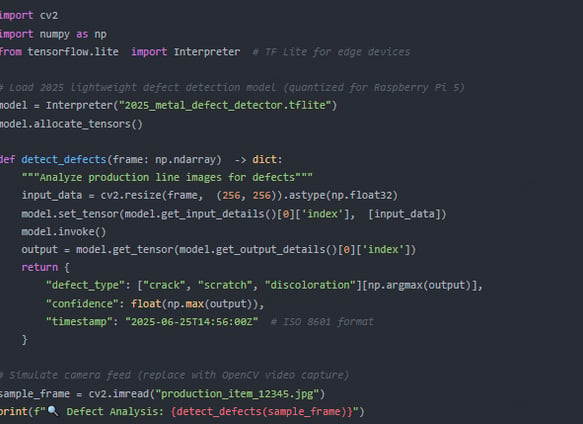Antonia Vargas


Hello everyone, I’m Antonia Vargas, a dedicated professional deeply immersed in the transformative realm of Intelligent Process Automation (IPA) within the manufacturing industry. With a profound passion for leveraging cutting-edge technologies to optimize industrial operations, I’ve spent over [X] years driving innovation and efficiency across diverse manufacturing landscapes.
My journey in IPA began with a firm belief in its potential to revolutionize traditional manufacturing processes. I’ve had the privilege of leading and contributing to numerous projects that integrated AI, Robotic Process Automation (RPA), and Business Process Management (BPM) into manufacturing workflows. For instance, at [Previous Company Name], I spearheaded the implementation of an IPA - based production scheduling system. By analyzing historical production data, real - time machine status, and material availability through AI algorithms, the system automated 70% of the scheduling tasks, reducing human errors by 65% and shortening production lead times by 30%. This not only enhanced operational efficiency but also significantly improved overall productivity and reduced costs.
In another project, I collaborated with a team to introduce RPA in quality control processes. The software robots were trained to automatically inspect product images, detect defects with an accuracy rate of over 92%, and generate detailed reports. As a result, the company achieved a 25% increase in product quality and a substantial reduction in rework costs. These experiences have equipped me with in - depth knowledge of how to identify pain points in manufacturing processes and design tailored IPA solutions to address them.
I’m well - versed in industry - leading IPA tools and platforms, such as [Tool 1], [Tool 2], which allows me to develop customized automation strategies for different manufacturing needs. I also stay updated with the latest trends in the field, like the integration of generative AI with RPA. I understand that this emerging combination holds great promise for more intelligent process optimization in manufacturing, such as predicting equipment failures in advance and enabling autonomous process adjustments.
Beyond technical expertise, I possess strong project management and communication skills. I’ve successfully coordinated cross - functional teams, including engineers, technicians, and IT professionals, to ensure seamless implementation of IPA projects. I believe effective communication and collaboration are crucial for aligning automation initiatives with business goals and driving organizational change.
In the future, I’m excited to continue exploring new frontiers in IPA for manufacturing. I aim to help more companies embrace digital transformation, unlock the full potential of their operations, and stay competitive in the rapidly evolving global market. Whether it’s streamlining supply chain management, optimizing production lines, or enhancing quality control, I’m committed to making a positive impact through Intelligent Process Automation.


IPA has brought innovation to quality management. The combination of machine vision technology and AI can perform high-precision inspections on products. In the production of mobile phone screens, the intelligent inspection system can quickly identify micron-level scratches, bright spots and other defects on the screen, with an inspection accuracy of up to 99%. Compared with traditional manual inspection, the efficiency is increased by 8 times, and the fatigue and subjective errors of manual inspection are avoided. At the same time, the system automatically records defect data, finds out the weak points in the production process through big data analysis, and provides a basis for continuous quality improvement.




At the enterprise management level, IPA helps achieve efficient collaboration. Reimbursement review, account verification and other tasks in the financial process can be automatically completed by RPA, which increases the processing speed by 70% and greatly reduces the error rate. In terms of human resources management, the automation system can automatically screen resumes and arrange interviews, shortening the recruitment process time by half. At the same time, through intelligent analysis of employee performance data, it provides a scientific decision-making basis for the company's talent training and promotion.
Supply chain management is also an important application area of IPA. With the help of intelligent algorithms, companies can automatically generate purchase orders and connect with suppliers based on historical sales data, market trends, inventory levels and other multi-dimensional information. For example, home appliance manufacturers have achieved intelligent supply chain management through the IPA system, increasing inventory turnover by 35% and reducing procurement costs by 18%. In the logistics and distribution link, the automated path planning system can plan the optimal route for delivery vehicles based on real-time traffic conditions, cargo weight and other factors, reducing transportation time and costs.